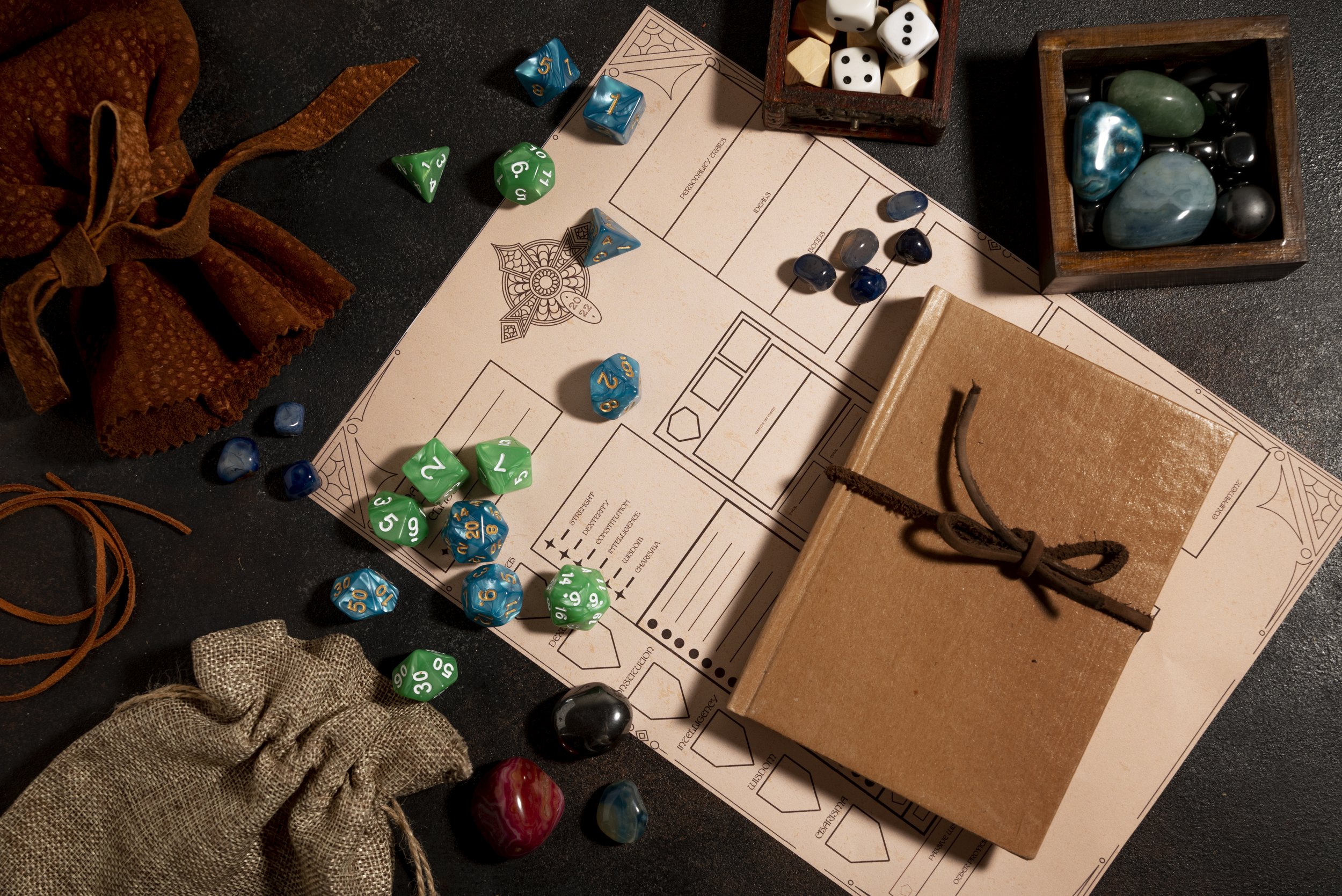Therapeutic Role Play Gaming
What is Role Play Gaming?
Role play is essentially taking on another role outside of who you are. That can include a variety of possibilities from childhood pretend play like house, “you’re the mommy and I’m the daddy and we are taking care of our dragon baby named Florida” (which is a true play scenario my daughter concocted) to playing an army ranger in a video game to playing George Washington in a school play to “faking it til you make it” in your first board room presentation. All that and more incorporates elements of role play. Table top role play gaming (TTRPG) is specifically a game genre where you take on the role of a character, one that you have created or is provided for you, then engage with the game elements through that character. These game elements are typically: puzzle/exploration, social, and combat. Through these, you are challenged to use your character’s skills, abilities, and personality to interact with the world. There is often a game master (GM) who runs the game, makes sure that the rules are followed, and plays the roles of the non-player characters (NPCs). TTRPGs can use as many or as few accessories as the GM would like. This means that some games are completely using your imagination while others have elaborate maps, images, miniature game pieces, buildings, and scenery. Most TTRPGs use dice as a primary game mechanic to interact with the world and its people. You would roll based on your character’s traits to see whether or not something you chose to do was successful. This adds an element of chance and raises the stakes some. The most well known TTRPG is Dungeons & Dragons (D&D), which even if you aren’t into games you might know of if you’ve seen Stranger Things.
How can Role Play Gaming be Therapeutic?
TTRPGs are a relatively new therapeutic intervention that has been gaining momentum over the past few years with increased interest in TTRPGs. There is research that supports the effectiveness of role play as a vehicle for increasing functional social skills, distress tolerance, and attention. All role play has the potential to be therapeutic, but not all role play is therapeutic role play. The research also highlights in the importance of intention for therapeutic role play. Reading a good book is therapeutic in that it is relaxing, engaging, and enlightening. That does not mean that books are therapy. Therapeutic role play is the intention use of role play gaming elements to practice and integrate skills and attitudes. Role play is a well established intervention where the therapist instructs the client in an approach and they act it out together. Rather than talking about it and doing awkward role plays in a therapy office, the clients are able to use new skills in a more natural sense through the safety of distance as their characters are the ones taking on the new skills. This distance allows for more flexibility and creativity. Immersion through play allows for clients to embody the act while their character does what they might not be able to. Through immersion and within a supportive environment overseen by a trained professional, the clients can assimilate what they have learned into their own lives.
The following paragraph is from a research literature review entitled “Let Your Clients Fight Dragons: A Rapid Evidence Assessment regarding the Therapeutic Utility of ‘Dungeons & Dragons’ “.
“It appears that D&D facilitates higher levels of creativity (e.g., Chung, 2013) and empathy (e.g., Rivers et al., 2016). This was linked toa variety of other factors, for example, maintaining friendships and general feelings of connectedness, exploring varying lifestyle models (e.g., Wilson, 2007), as well as a heightened ability to consider group’s needs and more balanced differential moral reasoning (Wright et al., 2020). As such, the findings are reminiscent of the wider roleplaying literature, where positive effects can be observed, such as increased self-awareness, empathy (Meriläinen, 2012) and improved ethical reasoning (Simkins, 2010), especially among adolescents (Carnes & Minds on fire, 2014). JOURNAL OF CREATIVITY IN MENTAL HEALTH 393 Rivers et al. (2016) discussed that a driving factor could be the high levels of immersion they found among D&D players.”
This is an example of just some of the research that supports the effectiveness of utilizing role play immersion to practice social-emotional skills live within a supportive environment.
Therapeutic GMs can also be well versed in safety tools, assessment, and de-escalation should there be anything particularly challenging within the role play environment. GMs can support clients in managing their emotions while taking on challenging subjects as well as knowing when and how to present those challenges to encourage success and growth while avoiding potential harm.
Where can I learn more or take part?
If you are interested in learning more, then I encourage you to explore the websites listed below:
Research: Can Playing Dungeons & Dragons be Good for You?
Literature Review: Let Your Clients Fight Dragons (cited above)
